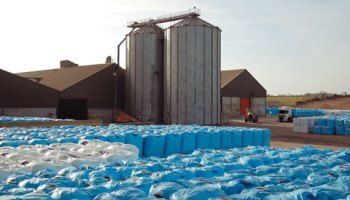Tanko Mohammed
The Dangote Fertiliser plant has been identified as a crucial project that would spur the attainment of the United Nations Sustainable Development Goals (SDGs) and Africa Union Agenda 2063.
Mrs Roseline Okere, Spokesperson for Dangote Industries Limited, on Tuesday in Lagos said Charge D’Affaires, Embassy of Nigeria in Senegal , Mr A.K Zanna, stated this while receiving officials of the company in Dakar recently.
Zanna said realisation of the UN SDGs would not be possible without the use of fertiliser in crop production.
According to him, the AU Agenda 2063 and the SDGs are geared toward the promotion of food production and poverty alleviation.
“You cannot promote food production without the application of fertiliser.
“I believe that the Dangote fertiliser is going to assist food production in Africa,” he said.
Zanna affirmed the belief that Africa would require increased food production in order to feed its growing population.
“There is growing population in Africa, which means we also need sustainable food production.
“To increase food production, there should also be increase in yield and you cannot get increase in yield without adequate use of fertiliser.
“So, Dangote Fertiliser Plant is coming in handy for the promotion of the Africa Union Agenda 2063 in terms of increased food production,” he added.
Zanna also lauded contributions of Dangote Cement’s investment in Senegal and Africa in general.
He also said the 650,000 barrels-per-day Dangote Petroleum Refinery, which had reached an advanced stage of construction in Lagos, would help bridge supply gap of petrol in Africa.
Also, Country Manager, Dangote Cement, Senegal, Mr Luk Haelterman, attributed the success of the company in Senegal in the past five years to its investment in quality production.
According to him, the company’s introduction of 42.5-degree brand of cement to the major market in Senegal upon entry, has enabled it gain the desired market share in the country.
He said: “The success of Dangote Cement is coming from quality planning based merely on improvement on the quality of cement to 42.5R that was not
available everywhere and certainly not to everybody at affordable price in
market share that we needed.
“Secondly, without any doubt is the creation of a very good team spirit and
passionate involvement in aiming at continuous improvement toward
excellence.
” When we entered the market, it was characterised by 32.5-grade
cement. We supplied 42.5-grade cement at affordable price. Putting up quality
gave us a chance to enter the market.”
Haelterman also disclosed that Dangote Cement Senegal had developed a culture of supporting local employees and prioritising local hiring.
He said this allowed local country employees to obtain the requisite knowledge, experience and support to take up key roles within the company.




